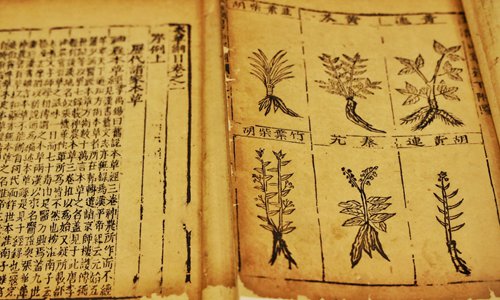Over 50 million Chinese ancient incomplete books need to be repaired: experts
By Chen Xi Source: Global Times Published: 2020/9/10 8:37:31

Ancient book on display Photo: Li Hao/GT
Chinese experts said that over 50 million Chinese ancient incomplete books need to be repaired and emphasized the importance of the protection of ancient books after a forum about collecting ancient books was held in Beijing on Monday.
Wei Li, a researcher of the protection of ancient books at the Palace Museum, told the Global Times on Wednesday that about 1,000 years ago, ancient books were usually collected by private collectors, and they were later donated to national libraries after the foundation of the People's Republic of China in 1949.
According to Wei, China has about 50 million ancient books that are incomplete and need to be restored. Most ancient books have been collected in China, but some are in other East Asian countries including Japan, Vietnam and South Korea as well as some big libraries in the US and the UK.
The libraries' ancient book departments are usually in charge of the restoration work. Currently, the restoration work has been carried out for over ten years, and some universities and institutions have started related majors, aiming to train some technical workers in the field.
Wei said that the restoration work in the East and the West is different in terms of printing methods.
Chinese books are printed on single pages, while books in the West are printed on double sides. But the method can be combined sometimes.
Wei said he hopes for more communication and dialogue in repairing ancient books between the East and the West, just as Chinese experts have helped to repair Notre Dame in cooperation with France.
Wei emphasized the importance of fixing ancient books by saying that paper books cannot be replaced by e-books since "paper books can build an emotional connection with the readers."
He gave an example of a recent exhibition of paintings, calligraphy, epigraphy rubbings and documents of Su Shi, one of China's greatest poets of the Northern Song Dynasty (960-1127), at the Palace Museum. The reason why so many people came to Beijing to see the exhibition is that they like the poet and also the original artworks that Su drew and the items he wrote on himself.
Wei also pointed out the importance of protecting ancient books about the Chinese minorities, including Tibetan Buddhist scriptures.
Generally, the Chinese language is typeset vertically, but the Tibetan Buddhist scriptures are typeset horizontally and printed on both sides, so the experts usually use the pulp method to fix the ancient books.
"The ancient books are the record of our ancestors' history. I hope more people can realize the importance of protecting them," said Wei.
Posted in: BOOKS